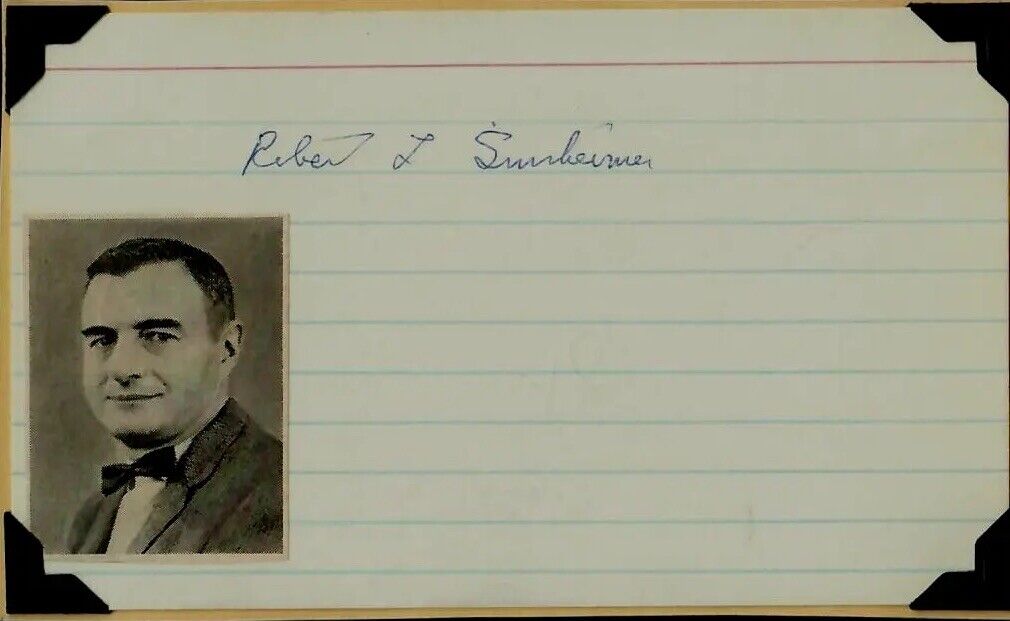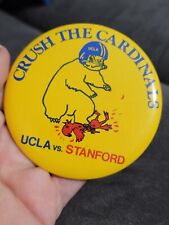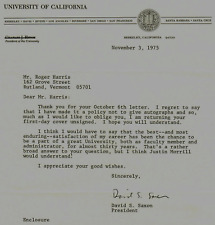RARE "UCLA Chancellor" Robert L. Sinsheimer Hand Signed 3X5 Card For Sale

When you click on links to various merchants on this site and make a purchase, this can result in this site earning a commission. Affiliate programs and affiliations include, but are not limited to, the eBay Partner Network.
RARE "UCLA Chancellor" Robert L. Sinsheimer Hand Signed 3X5 Card:
$349.99
Up for sale a RARE! "UCLA Chancellor" Robert L. Sinsheimer Hand Signed 3X5 Card.
ES-5983E
Robert L. Sinsheimer, an internationally
acclaimed biologist and chancellor emeritus of the University of California,
Santa Cruz, died on April 22 in Santa Barbara, California. He was 97. As a
scientist, Sinsheimer made significant breakthroughs in genetic research by
artificially creating functional strands of DNA. He was also one of the first
scientists to propose and seriously consider that a concerted effort be
undertaken to sequence the human genome. “Dr. Sinsheimer left an indelible mark
on campus and in the greater scientific world,” UC Santa Cruz Chancellor George
Blumenthal said. “He was a tireless advocate for UC Santa Cruz and was widely
respected by the campus community.” In 1985, Sinsheimer convened a group of
eminent scientists at UC Santa Cruz to discuss the feasibility of sequencing
the human genome. This historic workshop planted the idea for what eventually
became the Human Genome Project, and UCSC scientists led by David Haussler
ultimately played a crucial role in assembling the first human genome sequence
in 2000. Sinsheimer was also an outspoken advocate of science's accountability
to society. As early as the mid-1960s, he came to realize that advances in
genetics would have profound social consequences. When recombinant DNA
technology arose in the 1970s, giving scientists the ability to splice together
genetic material from different organisms, he used his position as an
acknowledged authority in the field to warn of potential hazards. And when he
proposed sequencing the human genome, he hoped at the same time to focus
attention on the social and ethical concerns such a project would inevitably
raise. Sinsheimer served as chancellor of UC Santa Cruz from 1977 to 1987. He
oversaw growth in academic programs and student enrollments at the campus
during an era of tight educational budgets. A new undergraduate major in
computer engineering was established, and graduate enrollments doubled from 350
to 700. New graduate programs and important new research activities were
developed during his tenure, including major expansions in linguistics and
high-energy physics and new research programs in seismology, agroecology, and
applied economics. Sinsheimer was also involved in writing a new academic plan
for the campus. Sinsheimer's distinguished career as a teacher and
administrator included nine years as chairman of the Division of Biology at the
California Institute of Technology. After his tenure at UC Santa Cruz,
Sinsheimer joined the faculty at UC Santa Barbara as a professor of molecular,
cellular, and developmental biology. He retired in 1990, but remained active in
laboratory research for many years. In 2001, Sinsheimer received the University
of California's Presidential Medal for his contributions to knowledge and to higher
education. Then-UC President Richard C. Atkinson presented the medal at a
ceremony during the UCSC Human Genome Symposium, noting the role Sinsheimer
played in initiating the Human Genome Project, his achievements as a biologist,
and his leadership of the UC Santa Cruz campus. Sinsheimer was born in
Washington, D.C., and attended high school in Chicago. In 1936, at the age of
16, he enrolled at the Massachusetts Institute of Technology (MIT), intending
to become a chemical engineer. Instead, he joined a new 5-year program leading
to a combined S.B. and S.M. degree in quantitative biology and biological
engineering, graduating in 1941. His intention to pursue graduate studies in
biochemistry was interrupted by World War II, during which time he worked on
aircraft radar as a staff member of the MIT Radiation Laboratory. Following the
war he enrolled in the fledgling biophysics graduate program at MIT, earning
his Ph.D. in 1949. Sinsheimer taught briefly at MIT before moving to Iowa State
College in 1949, where he was a professor of biophysics. In 1957, he accepted
the post of professor of biophysics at Caltech, where he worked for the next 20
years before accepting the position of chancellor at UC Santa Cruz. A member of
the National Academy of Sciences, Sinsheimer received numerous awards and
honors for his achievements. He was named California Scientist of the Year in
1968. He authored some 200 publications in his various areas of research
interest, as well as an autobiography, The Strands of a Life: The Science of
DNA and the Art of Education, published in 1994.

Related Items:
Rare NCAA UCLA Vs Stanford Vintage Pinback Button Crush Cardinals As-Is E
$24.95
RARE "UCLA Chancellor" Robert L. Sinsheimer Hand Signed 3X5 Card
$349.99
RARE “UCLA President" David S. Saxon Hand Signed TLS Dated 1975
$209.99



